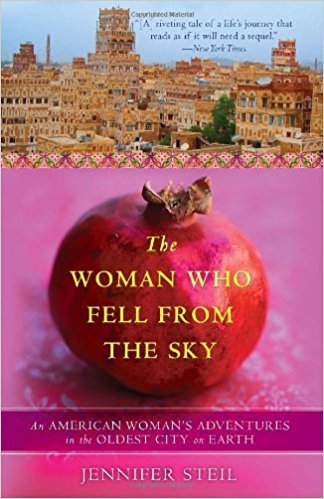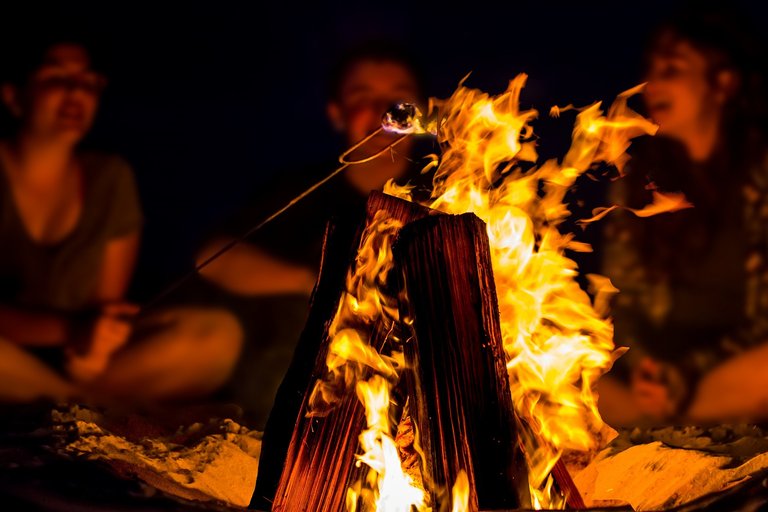
I have the pleasure of working with five amazing women through the Center for Creative Writing, which I now direct, and one of them is prose writer and journalist Jennifer Steil. I’ve had her memoir The Woman Who Fell from the Sky on my bedside table for a while now and committed to reading it when I arranged for Jennifer to give a reading at the college where I work.
See, Jennifer was planning to fly in to attend a retreat I was hosting for all my Center teachers. But she currently lives in London and, well…Is there anything else you want me to do, if I’m already making the trip? she asked me when the retreat was in its planning stages.
Writers need work. I knew her memoir was about editing a newspaper in a war-torn country, so she and I collaborated on a pitch to have her read and talk about peacebuilding through art, peace efforts in Yemen, and her experiences witnessing peace and conflict as a Westerner in a Muslim city in 2006, for which she would earn an honorarium from my department at the college (peace studies).
Jennifer flew in the first week of October in the middle of a Stacia hurricane. At the college, I was preparing for a big board meeting and coordinating her reading. For the Center, I was planning our retreat–working out a schedule, finalizing reservations, assisting teachers with travel plans, grocery shopping, laundering borrowed linens to dress beds, etc. etc. etc.–and responding to my students (of whom I currently have double what I did last session). The domestic violence non-profit where I serve on the board of directors was gearing up for a fundraising event the same weekend as my retreat. And I was fighting off a cold. Jennifer was so warm and gracious and accepting of my frantic pace.

Jennifer knows a bit about frantic paces. The Woman Who Fell from the Sky became a book idea after an old boyfriend who was living in Yemen contacted her and invited her to give a three-week journalism 101-style class to the Yemeni staff. That class went so well that the paper’s editor offered Jennifer a one-year position as the paper’s editor-in-chief, which she eventually accepted. The memoir tells of this one year the author spent living and working in the oldest city in the world.
According to Jennifer, in many parts of Yemen, “people are living exactly as they did thousands of years ago.”
The ancient landscape reveals little of the passage of time…Long stretches of empty beaches in the south are touched by the same tides that have washed them since the Flood. In the east, desert sands shift in barely perceptible ways. The green terraces carved into the Haraz mountains in the west or the hills around Ibb and Ta’iz to the south may have been there since the dawn of agriculture, cultivated by generation after generation of Yemeni farmers. The dense vegetation of the valleys suggests the whim of a playful god who, weary of the relentless beige of Arabian rock and sand, tossed a thick emerald quilt over Yemen’s countryside, creating a fertile layer that has fed the Yemeni people for generations.
How beautiful and serene does this sound?
Except that, since Jennifer left Yemen, the country’s situation has quickly devolved. During her Q&A after her reading at the college, Jennifer spoke of the dangers of traveling in Yemen in 2017, through the lens of being married to a British diplomat who was stationed there while she was editing the Yemen Observer. I’m reminded of the risks people take in making art, reporting the truth they see all around them, serving in wars they didn’t start, and working toward peace that may never come.
The board meeting came and went, as did Jennifer’s campus event. I had to reconcile with sort of un-involving myself in the fundraiser, to accepting my energetic limitations. The retreat was a hard-won success–no wifi, no cell service, very remote, and a brief and messy couple of hours where we thought we were losing all indoor plumbing, but also full of productivity, laughter, intelligent conversation, and female energy. When my teachers and I were relaxing in the woods after a long afternoon of brainstorming and planning for the Center’s future, I looked around the roaring campfire I’d made for us and marveled at how differently women behave when there are no men around. We were raucous in our isolation; who was there to hear us whoop and shriek and throat-laugh, mouths stained with wine, fingers sticky with too many s’mores? I thought of the women in Jennifer’s Yemeni newsroom, who had to be accompanied–but not alone with, never ever alone with–a man to do any reporting at all. I thought of how they gathered in elaborate celebration of someone’s pending nuptials, faces, hair, and bodies uncovered and adorned.

We are not all so different, are we?
Except in our experiences of the world. I loved this book’s honest grappling with cultural differences and white privilege, as well as Jennifer’s friend-talking-to-a-friend style of writing. There were also moments when I laughed out loud, including when one of her friends from New York mailed her a package that included, unbeknownst to her, a vibrator that deeply offended the Yemeni customs agents. Insert joke about teaching journalists to avoid using buzz words.
Jennifer told me she missed her Yemen friends, especially the women she met, and that she’d love to be able to go back some day. I wasn’t there, but I said, me too, because reading her book made me experience the country in some of the same ways she did: as an outsider, a liberal Westerner, a woman, and a writer. I’d love to see it “again.”
This post first appeared at my blog another writing mom, as part of my ongoing 100 memoirs project. See also:
100 memoirs project #1: Things I wrote down while reading Mary Karr's The Art of Memoir
100 memoirs project #2: Some Bright Morning I won't hyper-relate to DV narratives
Hi! I am a robot. I just upvoted you! I found similar content that readers might be interested in:
https://anotherwritingmom.wordpress.com/2017/10/13/100-memoirs-project-3-the-book-that-made-me-want-to-visit-yemen-10-years-ago/